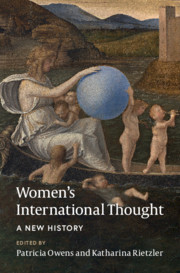Book contents
- Women’s International Thought: A New History
- Women’s International Thought: A New History
- Copyright page
- Contents
- List of Illustrations
- Contributors
- Preface and Acknowledgments
- Introduction: Toward a History of Women’s International Thought
- Part I Canonical Thinkers
- 1 Anna Julia Cooper on Slavery’s Afterlife: Can International Thought “Hear” Her “Muffled” Voice and Ideas?
- 2 Revolutionary Thinking: Luxemburg’s Socialist International Theory
- 3 Of Colonialism and Corpses: Simone Weil on Force
- 4 Ideas in Action: Eslanda Robeson’s International Thought after 1945
- Part II Outsiders
- Part III Thinking in or around the Academy
- Index
3 - Of Colonialism and Corpses: Simone Weil on Force
from Part I - Canonical Thinkers
Published online by Cambridge University Press: 07 January 2021
- Women’s International Thought: A New History
- Women’s International Thought: A New History
- Copyright page
- Contents
- List of Illustrations
- Contributors
- Preface and Acknowledgments
- Introduction: Toward a History of Women’s International Thought
- Part I Canonical Thinkers
- 1 Anna Julia Cooper on Slavery’s Afterlife: Can International Thought “Hear” Her “Muffled” Voice and Ideas?
- 2 Revolutionary Thinking: Luxemburg’s Socialist International Theory
- 3 Of Colonialism and Corpses: Simone Weil on Force
- 4 Ideas in Action: Eslanda Robeson’s International Thought after 1945
- Part II Outsiders
- Part III Thinking in or around the Academy
- Index
Summary
Simone Weil was an unsettled thinker intent on disturbing preconceived categories and thinking in opposites. Kinsella’s essay invites us to re-read this compulsive outsider both for her theoretical contributions and for the ways in which she challenged conventional notions of what it meant to be an intellectual. Her asceticism, androgyny and complex religious identity made her a ‘lonely’ figure and prefigured her erasure as an international thinker. Kinsella roots Weil’s political philosophy in a penetrating analysis of colonialism. The despoliation of human beings and their environment lay at its core. Colonialism’s end could not be brought about by political means but on grounds that transcended politics and comprised an empathetic understanding of the degradation of people and land, an understanding she sought to achieve through the attempt to obliterate any collective identities in her person. Reading Weil invites readers to re-think the connection between international relations, empire and the spiritual.
- Type
- Chapter
- Information
- Women's International Thought: A New History , pp. 72 - 92Publisher: Cambridge University PressPrint publication year: 2021
- 1
- Cited by

